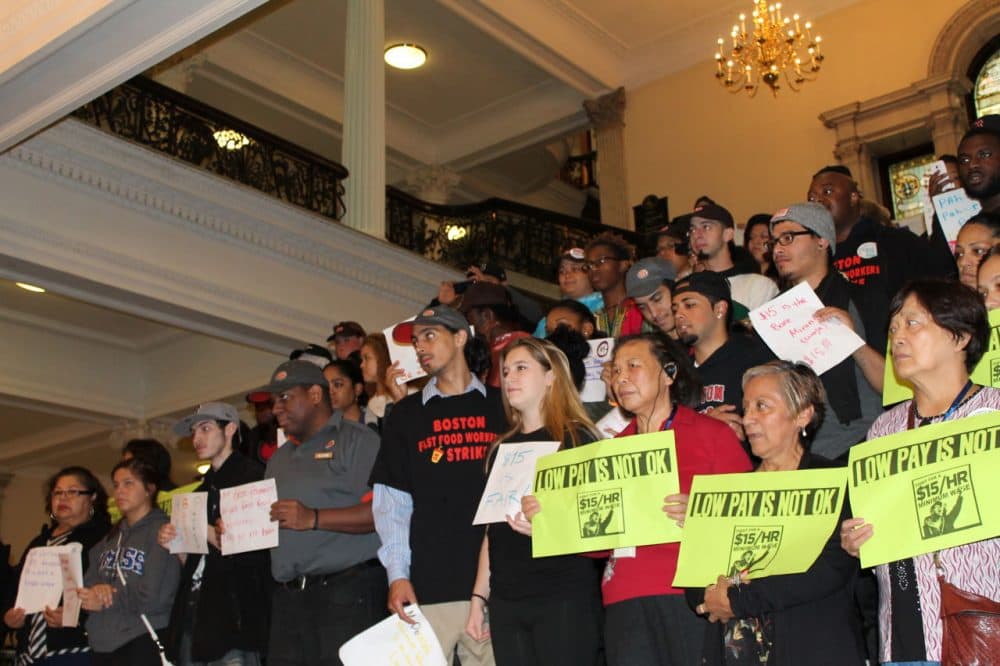Advertisement
Despite Increases, Mass. Workers Argue Minimum Wage Still Not High Enough

The $9 per hour wage Theresa Pennington earns working at a Dunkin' Donuts in Lowell is not enough to be able to afford an apartment of her own. Instead, she said, she lives with friends, but that means she is not able to keep custody of her 5-year-old daughter.
"The fast food industry is one of the fastest growing in America and more and more of the workers look like me," Pennington said. "We are not teenagers looking for pocket change. We are women and men, we are working adults and we are trying to raise families."
Pennington was one of dozens of fast food workers who rallied at the State House on Tuesday to urge lawmakers to boost the minimum wage to $15 an hour by 2018 and to support bills they say would make scheduling fairer for employees.
Jena Benson, an 18-year-old student at Bunker Hill Community College who works at Dunkin' Donuts, told the Joint Committee on Labor and Workforce Development that much of the money she earns is used to help pay the rent and bills at the apartment she shares with her mother.
"Making under $15 an hour makes it hard for me to do this," she told the committee. "I'm only 18 and I just started school. It is hard for me to balance school and the homework I have to do when I can't really cut down on the hours I work because I still need money to be able to afford the things me and my mom need and try to save some at the end of the week."
Benson and Pennington spoke in favor of bills (H 1773/S 1024) that would increase the minimum wage for employees at big box retail stores and fast food chains to $15 per hour by Jan. 1, 2018. They were joined by the Raise Up Massachusetts and Wage Action coalitions in pushing for workers' rights bills that also address scheduling and the tipped worker's minimum wage.
Just last year, the Legislature voted to raise the state's minimum wage to $11 an hour by 2017, with the second phased-in increase to $10 per hour set to take effect in January.
The committee heard testimony in support of a bill (S 973) that would direct the Executive Office of Labor and Workforce Development to develop regulations for businesses with more than 75 employees to require them to pay employees if any changes are made to their work schedule on short notice.
But several small business organizations told the committee that such legislation is an attempt to micromanage small businesses by placing undue pressures on them.
"We're seeing small business as we knew it disappear. And why? Because legislation puts pressures on them they simply cannot handle," Frank Anzalotti, executive director of the Massachusetts Package Store Association, said. "Scheduling is a huge, huge concern for these folks. It's important that a small business owner can stay competitive by managing his staff so adequate staff, happy staff can keep customers happy."
Sen. Daniel Wolf, co-chair of the committee and CEO of Cape Air, said he believes there is a way to "thread the needle" with legislation on worker schedules that is sensitive to both businesses and workers.
"I'm speaking as an employer now ... the challenges and pressures put on both the business side and the employee side are really different than they were a generation ago," he said. "I'm going to talk about collaboration on this because we have a world where the employee can't be as flexible as maybe they used to be and the pressures on the employees are different, as they are on the employer."